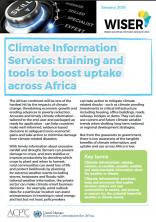Climate Information Services: training and tools to boost uptake across Africa

The African continent will be one of the hardest hit by the impacts of climate change, threatening economic growth and eroding advances in poverty reduction. Accurate and timely climate information - tailored to the end-user and packaged up ready for application - can help countries make well-informed, evidence-based decisions to safeguard socio-economic gains and take action to minimise damage from climate-related disasters. With timely information about excessive rainfall and drought, farmers can prevent damage to crops, and even stabilise or improve productivity by deciding which crops to plant and when to harvest; rural communities can avoid loss of life and protect livelihoods by planning for extreme weather events including storms, heatwaves and floods; with tailored weather information, the private sector can make climate-smart business decisions - for example, wind outlook data for a particular location can assist entrepreneurs in investing in wind energy; and last but not least, policymakers can take action to mitigate climate related shocks – such as climate proofing investments in critical infrastructure including housing, office buildings, roads, railways, bridges or dams. They can also use current and future climate variable trends when drafting long-term national or regional development strategies.